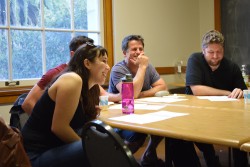What Should I Do if 12-Step Programs Aren’t Right for Me?
It is common for people to say that one treatment will never be right for everyone. However, this can be difficult to cope with, especially if you realize that 12-step programs, one of the most commonly used treatment options, are not beneficial to you. What should you do when you find out that 12-step programs aren’t right for you?
Consider Another Non-12-Step Mutual Help Program
It can be hard to admit that 12-step programs are not beneficial to you, whether it is because of the religious aspect of the treatment or the assertion that you must admit to your powerlessness against the disease of addiction. If these are some of the concepts you are struggling with while you feel the support and encouragement aspects of the program are helpful, you could try attending a mutual-help group that is not based on the 12-step method. This way, you can still get the kind of help you need from other recovering addicts without having to give into the parts of the program that make you feel uncomfortable.
Below are some other non-12-step groups that you can find out more about:

There are many alternatives to 12-step programs, such as SMART Recovery and LifeRing Secular Recovery.
- SMART Recovery
- Women for Sobriety
- Secular Organizations for Sobriety (SOS)
- LifeRing Secular Recovery
Try Individualized Drug Counseling
Perhaps you are not ready to share your feelings with a large group of other individuals, which may mean that you should spend some one-on-one time with a therapist or a counselor before you open yourself up to group therapy. According to the National Institute on Drug Abuse, “Individualized drug counseling not only focuses on reducing or stopping illicit drug or alcohol use; it also addresses related areas of impaired functioning––such as employment status, illegal activity, and family/social relations––as well as the content and structure of the patient’s recovery program.”
There are also other types of counseling that could be helpful to you. Family therapy can be extremely beneficial, especially for adolescent addicts, and this can help you not only learn to communicate better with your loved ones but also teach them to be helpful supporters of your recovery. 12-step programs are not the only type of therapy available, and though these groups are free to join, many therapists and counselors at drug and alcohol addiction clinics will offer their services for free or on a sliding-fee scale in order to help patients with little or no income.
Gain Support Elsewhere
You must understand the importance of a support system during your addiction recovery, which is one of the main reasons why many individuals join AA and other 12-step programs in the first place. If you have a strong bond with friends, family members, coworkers, or another group of individuals who can support you during your recovery, you may not need a 12-step group, and this could be much more beneficial to you in the long run.
Do Not Allow Others to Dictate Your Recovery
It can be difficult to decide the 12 steps are not for you, especially because these groups are some of the most “well-known programs” available to recovering addicts (NIDA). But you must remind yourself that your recovery is your own and you deserve to work through your addiction in the best and safest way for you. For more advice, call us today at 800-895-1695.